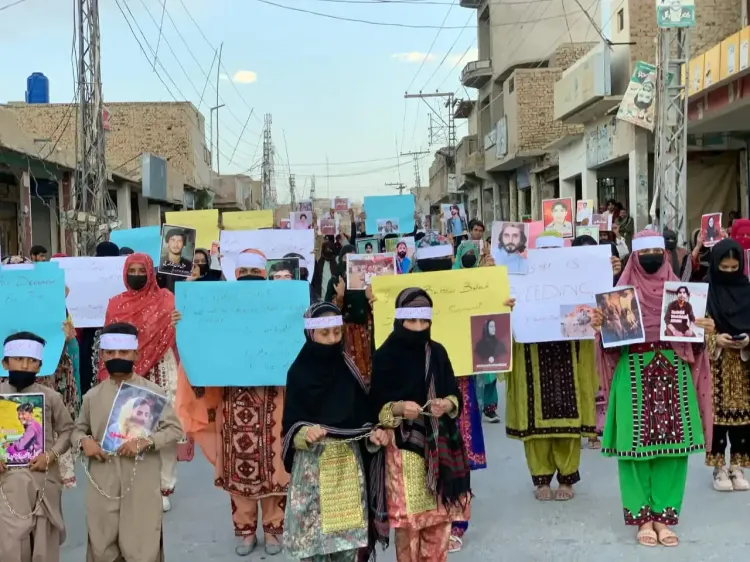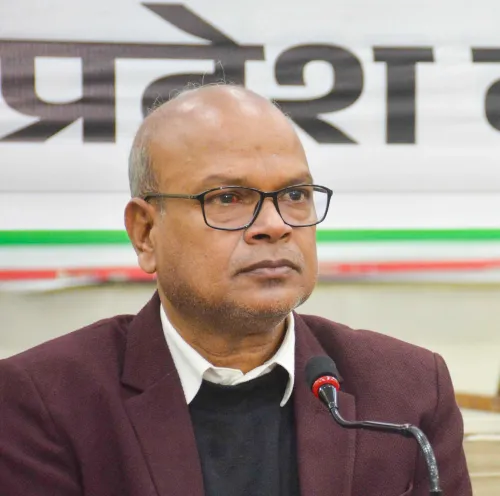Have Two Victims of Forcible Disappearances Been Executed by the Pakistani Army?

Synopsis
Key Takeaways
- Extrajudicial killings in Balochistan are a grave concern.
- The Baloch National Movement's Human Rights body plays a crucial role in advocating for victims.
- The plight of political prisoners is being highlighted by the BYC.
- International accountability is urgently needed.
- Human rights violations must be addressed to restore justice.
Quetta, June 12 (NationPress) The Baloch National Movement's Human Rights body Paank has vehemently denounced the extrajudicial killings of two more individuals who were victims of enforced disappearances, allegedly executed by the Pakistani army in Mashkai, located in Balochistan's Awaran district.
According to a statement from the rights organization, the Pakistani forces illegally executed Ali Muhammad and Nizar, both of whom had previously been victims of enforced disappearance, at the Mashkai Cantonment. Their bodies were subsequently transported to Mashkai Hospital. Ali Muhammad, son of Hakeem, was abducted during a military operation in Mashkai Khandri on February 1, 2025, where he endured torture while in custody. On June 11, he was executed, and his body was disposed of at the hospital.
Nizar was reported as having been forcibly disappeared on December 23, 2024, from Mashkai Mazarabad and was also executed on June 11 in the same cantonment. His brother, Guldad, continues to remain missing.
In their statement, Paank condemned the killings, asserting that these events underscore an ongoing trend of enforced disappearances followed by extrajudicial executions in Balochistan.
The human rights organization described the killings as a flagrant violation of international human rights laws and called upon international entities to investigate these acts and hold those responsible accountable.
Simultaneously, the Baloch Yakjehti Committee (BYC) raised concerns regarding the harassment of their leaders within Baloch prisons, demanding an immediate cessation of abuse by Pakistani authorities.
The BYC disclosed that the newly appointed jail superintendent of Hada Jail Quetta, Syed Hamidullah Pechi, has been persistently harassing its leaders.
"Jail superintendent Syed Hamidullah Pechi is not only denying the legal and human rights of political prisoners but is also employing an authoritarian and abusive demeanor, subjecting BYC leaders to various forms of mental and physical torture while continuously harassing their families, forcing them to wait for three hours outside the jail to see their loved ones," the BYC stated.
The BYC reported that its leaders, Bebigar Baloch and Shahji Baloch, have been confined to separate cells where they are deprived of medical attention, family visits, and other basic rights.
"When they protested against these injustices, Superintendent Syed Hamidullah Pechi responded with extreme rudeness and even attempted physical violence," the statement continued.
Concerns were raised by the human rights organization, particularly regarding Bebigar Baloch, who is physically disabled and requires continuous medical care, which the jail administration is blatantly denying.
"In a similar vein, BYC's primary organizer, Mahrang Baloch, along with her fellow inmates, Bebo Baloch and Gulzadi Baloch, are also facing ongoing harassment. The superintendent has further intensified restrictions on these female leaders, and when they voiced their demands for basic rights, they faced various forms of threats and harassment," the BYC stated.
The BYC warned the prison administration and superintendent to immediately cease the harassment of its leaders and restore their legal, human, and medical rights, asserting that they will not remain silent in the face of this oppression.










